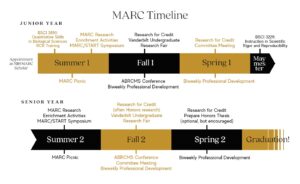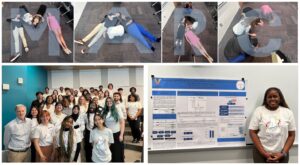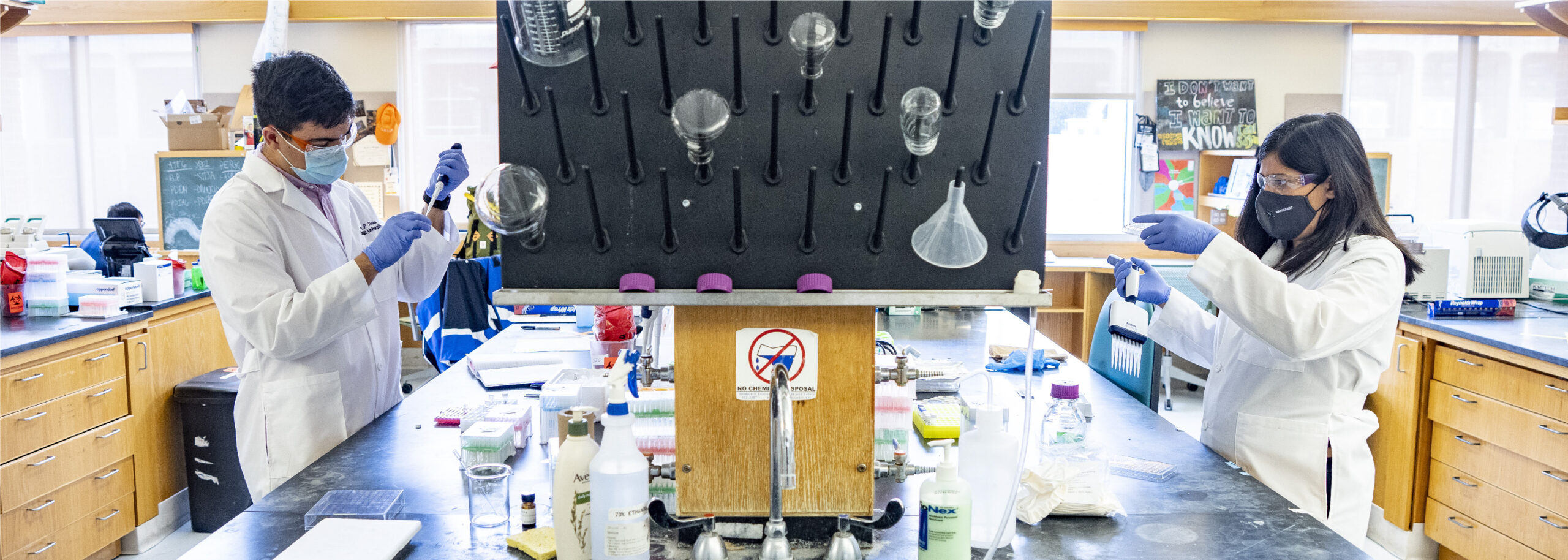MARC Program
The Vanderbilt MARC Scholars program promotes broad participation in the biomedical research workforce by strengthening research training and expanding the pool of well-trained undergraduate students who complete their baccalaureate degree and transition into and complete biomedical, research-focused higher degree programs (such as Ph.D. or M.D./Ph.D.). Funded by the National Institutes of Health, the program aims to provide all students with the resources they need to succeed in the biomedical research field.
Benefits of the MARC Program
- Engagement with a welcoming community of scientists
- Mentored full-time research in top Vanderbilt University labs
- 24 months of stipend support
- Summer stipend support for two summers of research
- Career development and student panels on graduate school and the M.D./Ph.D.
- Personalized training in scientific presentation
- Presentation of research at national conferences
Students can identify their interest in biomedical research and their future goals of training as a Ph.D. or M.D./Ph.D. as early as the first semester of their freshman year through participation in START. START advisory groups are led by graduate students or postdocs and meet several times each semester to learn about research opportunities at Vanderbilt, to discuss career paths in the biomedical sciences, and to foster research participation. START and MARC scholars engage in academic year and summer biomedical research, both at Vanderbilt University and nationally, including with scientists at other major research universities.
Applying to MARC
Students apply in the spring of their sophomore year for MARC Scholar funding, which provides a 24-month stipend to permit continued research engagement during the academic year and summers, as well as tuition support. MARC Scholars share their research findings at national meetings of biomedical scientists in their research area, as well as participating in career and professional development training to help prepare them for successful entrance into Ph.D. and M.D./Ph.D. programs following graduation. We encourage all eligible* individuals to apply.
*To be eligible for NIH MARC support, students must be U.S. citizens or permanent residents and major in one of the sciences or engineering fields related to biomedical science.
Applications for the 2025-2027 cohort are CLOSED. Reviews will begin shortly and applicants will be contacted for more information.
For questions, please contact VandyMARC@vanderbilt.edu.

![]() 2024 MARC Summer Research
2024 MARC Summer Research

MARC and START Summer Research Symposium 2024
During summer 2024, 9 MARC Scholars engaged in 9 weeks of intensive summer research, mentoring, and career development at Vanderbilt. Three Scholars pursued research at other institutions (MIT, Harvard, and University of Pennsylvania). MARC and START students engaged with the Vanderbilt Summer Science Academy and met biweekly for enrichment sessions, including presentations from the Career Center and the Immersion Office. Students wrote and edited abstracts of their work with help from graduate students and attended a workshop on best practices for poster and oral presentations.
The MARC/START Summer Symposium was a highlight with 45 oral and poster presentations from the MARC and START Scholars, Beckman Scholars, and several affiliated students. It was an exciting day to learn from each other and celebrate our accomplishments!
2024 Meeting Presentations
In November of 2024, four START Summer Scholars traveled along with the MARC Scholars to Pittsburgh, PA to attend ABRCMS, the largest undergraduate research meeting on the United States. There, they presented their research, attended lectures by preeminent scientists, met with representatives of graduate and professional programs from myriad universities, and networked with faculty and students from across the country. The Scholars were accompanied by Dr. Kathy Friedman and MARC mentor Christina Chavez. Nate Kreuzer (MARC, class of 2026) won a presentation award for his poster!

2024 MARC Scholar Outcomes
Congratulations to our third graduating class of MARC Scholars who matriculated into a Ph.D. program at MIT, a Master’s program at Texas A&M University at Galveston, and an MD program at University of Alabama, Birmingham. The other Scholars are applying for PhD or MD/PhD programs while serving as research technicians.
MARC Preceptors
View the current list of preceptors, lab information, availability, and project descriptions.
Articles about Vanderbilt MARC program
MyVU article about 2023 Symposium
National Institute of General Medical Sciences – Catching Up With ReMARCable Vanderbilt Graduates
National Institute of General Medical Sciences – Making a MARC at Vanderbilt
FAQs
Scholars must be pursuing a major related to the biomedical sciences (e.g. biology, chemistry, biochemistry, physics, mathematics, neuroscience, psychology, engineering). All Scholars must be committed to pursuing a Ph.D. or combined M.D./Ph.D. program after graduation (not the M.D. only).
Students can apply in the spring of their sophomore year for MARC Scholar funding.
Applicants must be a U.S. citizen or permanent resident to be eligible for MARC support.
The program appoints six scholars each year.
The committee choosing successful scholars from among the applicants will consider many aspects of the application, including the prior performance of the student, promise in research, intent to earn the Ph.D., and the way in which the research program will prepare the student for that path.
The program is intended by NIH as a pre-Ph.D. program, not a pre-med program. It includes a lot of training activities specific to entering and succeeding in doctoral (Ph.D.) programs. Pre-Ph.D. includes M.D./Ph.D., but only students who are truly committed to the Ph.D. part should undertake the program.
I currently do not have a research mentor and therefore have not begun research, do I still qualify?
We expect that at this stage some students may have already initiated research, and some may not. What is key is your long-term interest in biomedical research as a career goal. The idea is that you can reach out now to faculty on the MARC research mentor list whose research may interest you. They know MARC applicants will be trying to initiate relationships at this time, so they are expecting that students will contact them and will welcome your inquiry. If you find a match, then they can write as your research sponsor on the application.
Yes. New mentors would need to request preceptor status. They can reach out to VandyMARC@vanderbilt.edu for information.
Yes, someone could indeed apply for both VUSRP and the MARC program, but there are very big differences. MARC provides two years of full-time research training; including two summers of support, stipend support during the AY, and summer and tuition support. VUSRP would provide one summer of research support only. It is possible to be accepted into both programs if the opportunity arose. To discuss these possibilities in more detail, please reach out to VandyMARC@vanderbilt.edu
We have bi-weekly meetings of the MARC program and students throughout the year for workshops on grad school applications, professional development, presentation practice and skills, and research talks. This provides a good balance and substantial community building.
A key feature of the MARC program is that each student has a mentoring committee of three faculty – their lab PI, plus two additional faculty who provide disciplinary and career expertise. Scholars meet at least once per year with their committee to give progress updates and get guidance and mentorship on research, as well as selection of graduate or M.D./ Ph.D. programs, and the application process. As a result, Scholars have three top faculty to guide them and to provide letters of recommendation, much like an honors project.
Please contact VandyMARC@vanderbilt.edu to apply or request for information.

